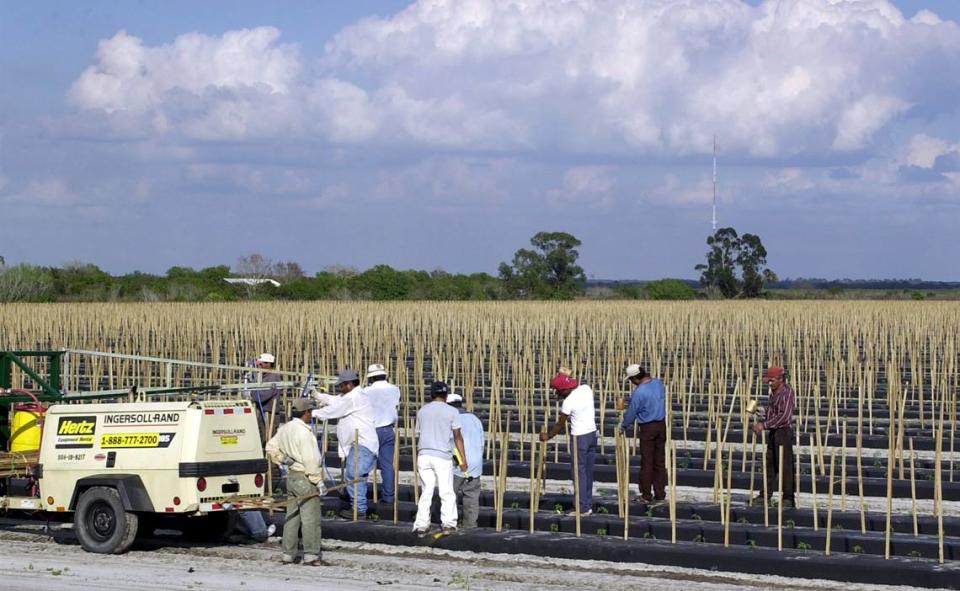Florida tomato grower will lay off 120 workers, citing competition with Mexican imports
Ag Mart Produce this month notified state officials that it will be conducting a mass layoff of employees at its Plant City office/warehouse and at its farms in Myakka City and Duette.
The company grows grape tomatoes under the brand name Santa Sweets. About 120 workers are affected, Ag Mart Produce said in a letter to the Florida Department of Commerce and Economic Opportunity.
The majority of the workers are in Plant City, but four are at the company’s Myakka City farm, 30975 State Road 64 E., and four are at the Duette farm, 3805 Taylor Grade Road.
The notice to the state is required under The Worker Adjustment and Retraining Notification (WARN) Act. It requires employers to provide notice 60 days in advance of covered plant closings and covered mass layoffs.
“Ag Mart has made the difficult decision to discontinue domestic farming operations and conduct this layoff due to the inability to compete with submarket pricing of imported produce from such areas as Mexico and the Dominican Republic,” the company said.
Employees were verbally notified of the layoffs between July 5-11 and in writing July 18, Ag Mart said.
Those losing their jobs range from farm managers to drivers, mechanics, clerks and warehouse staff.
“It is difficult to predict with certainty the exact termination date of these employees. The layoffs could begin as early as Sept. 15, 2023, and continue in phases until Feb. 29, 2024,” Ag-Mart said in the WARN notice.

Ag-Mart Produce previously laid off 10 workers at its Immokalee operation on May 3.
“The company’s policies do not allow for bumping rights, and the company employees are not represented by any labor organization,” the Ag Mart letter said.
The Santa Sweets website identifies it as a family-run company, which was founded by Joseph Procacci, owner of Procacci Brothers Sales Corp.
Procacci started his produce wholesale business out of a pushcart on the streets of Camden, N.J., in the 1940s.
“Santa Sweets firmly established itself as the premier high-flavor tomato supplier when Joe attained worldwide rights to the first ever grape tomato seed. Seizing a great opportunity to market a bite-sized tomato bursting with flavor and sweetness, Joe began growing and shipping grape tomatoes throughout the United States,” the webpage says.
Foreign competition
Florida tomato growers have long complained about foreign-grown tomatoes, particularly those from Mexico.
At one time, Manatee County had seven tomato packing plants, and now has three.
Bob Spencer, president of West Coast Tomato, said U.S. tomato companies continue to fight the dumping of foreign-grown tomatoes, which are produced without the benefit of health and safety regulations followed by domestic growers.
“They dump their tomatoes below the cost of production,” Spencer said. “It’s a tough battle. We’ve been fighting it for 25 years.”
“We are highly regulated to protect the consumer and we protect the worker in the field. If you care about the people who do the harvesting, you want to buy American,” Spencer said.
In 2008, a salmonella outbreak sickened more than 1,000 Americans and cost Manatee County tomato growers millions of dollars, the Bradenton Herald previously reported.
Investigators eventually traced the salmonella outbreak to irrigation water and peppers grown on farms in Mexico.
For several years, U.S. Rep. Vern Buchanan, R-Longboat Key, has been calling for passage of legislation that would help level the playing field between growers in Mexico and the United States.
This week, Buchanan and Rep. Debbie Wasserman Schultz, D- Weston, co-chaired a bipartisan meeting of Florida’s congressional delegation discussing agriculture issues affecting Florida with a focus on the upcoming 2023 Farm Bill.
Between hurricanes, citrus greening and Mexico’s illegal dumping of specialty crops, it has been a “trying year for Florida’s farmers and ranchers,” Buchanan said in a press release.
Florida’s citrus production is nearing a historic 100-year low — the worst since the Great Depression, Buchanan said.

